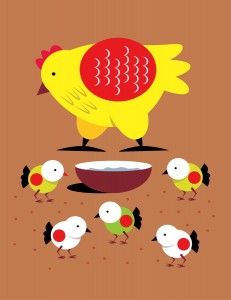Monthly Archives: April 2013
 If you only keep a couple of chickens around in order to have fresh eggs every day, then raising chickens is fairly simple, but if you are thinking about supplying the market with fresh chicken and eggs, then what you don’t know about chicken farming could definitely hurt both you and your budding enterprise.
If you only keep a couple of chickens around in order to have fresh eggs every day, then raising chickens is fairly simple, but if you are thinking about supplying the market with fresh chicken and eggs, then what you don’t know about chicken farming could definitely hurt both you and your budding enterprise.
Unlike the chickens in cartoons of old, nests don’t come complete with little tubes in which the eggs roll down to a waiting basket, ready for you to pick up and cart away. Proper handling and maintaining of both your chickens and their eggs can make all the difference, not only in the number of eggs that are produced, but also the numbers of chicks that successfully hatch twenty-one days after they are laid.
Raising chickens means setting up chicken houses properly, maintaining clean and sterile conditions for producing uniform sized eggs, and knowing what to do once you gather and transfer the fertilized eggs into the incubator. Sure, you could let the chickens do it, but in today’s fast-paced, competitive world, you need to be ahead of the game, and take the proper steps to get maximum efficiency in your egg and chick production. We all know that to do that you need happy, healthy chickens, with optimum hatching conditions. There is more to hatching an egg than just putting it into an incubator and leaving it until it hatches. There is also a lot more to maintaining your chicken hatchery and chicken houses than just feeding the birds. Precautions must be taken for the safety of the chicks as well as the hens and roosters. Chicken to rooster ratios must be exactly right.
 You also need to know what to do and how to care for your chicks once they are born. For example, chicks need to be introduced to a perch once they reach six weeks of age. Chicken houses should be kept locked at all times and conditions, and personnel should be strictly monitored. Checking your chickens for avian diseases, and knowing the procedures to help prevent them, is also very important. Then, if unfortunate circumstances arise, and you notice that you have some sick birds, you need to know what to do to prevent further infestation. The last thing you need is for influenza to spread to all the rest of your chickens. Too little action too late could result in massive losses, and no business can withstand that. Also, in some cases, as in the avian flu, the potential for spreading to humans can also be quite dangerous.
You also need to know what to do and how to care for your chicks once they are born. For example, chicks need to be introduced to a perch once they reach six weeks of age. Chicken houses should be kept locked at all times and conditions, and personnel should be strictly monitored. Checking your chickens for avian diseases, and knowing the procedures to help prevent them, is also very important. Then, if unfortunate circumstances arise, and you notice that you have some sick birds, you need to know what to do to prevent further infestation. The last thing you need is for influenza to spread to all the rest of your chickens. Too little action too late could result in massive losses, and no business can withstand that. Also, in some cases, as in the avian flu, the potential for spreading to humans can also be quite dangerous.
Keeping chickens can be fun, and if you do it right, financially rewarding too!


